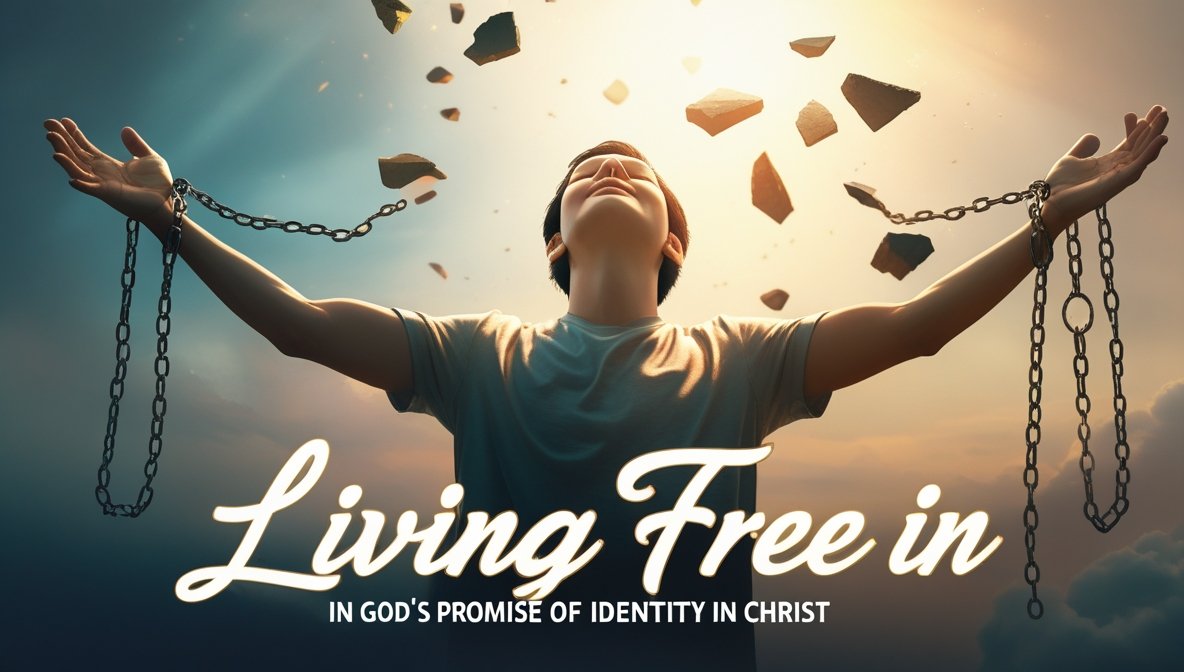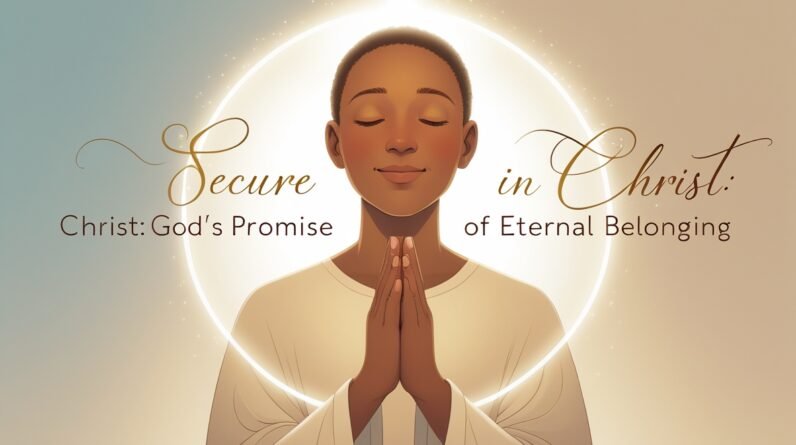Living Free In God’s Promise Of Identity In Christ
You may have felt, at times, like you’re defined by your mistakes, your history, or the painful labels others have placed on you. Yet the heart of the gospel promises something radically different: that you are given a new identity — not because of what you do, but because of who Christ is and what He has done for you. This truth is the cornerstone of identity in Christ’s freedom, and it frees you from shame, fear, and the exhausting pursuit of self-justification. When you read John 8:36 and Galatians 2:20, you encounter a promise and a reality: Christ sets you free and makes you new. This article will walk with you gently through Scripture and practical steps, helping you to live out the freedom God gives in your identity in Christ.
Why your identity matters
Who you are matters deeply. Your sense of identity shapes your choices, relationships, and how you respond to trials. Knowing your true identity in Christ changes everything — how you face failure, how you receive love, how you serve others. Your identity is not a label you earn; it is a gift you receive in grace. The phrase identity in Christ freedom means you are liberated from the tyranny of self, free to become who God intended you to be. This is not mere optimism; it is a truth rooted in the life, death, and resurrection of Jesus Christ.
What “identity in Christ” really means
You might hear “identity in Christ” used often, but it’s important to understand what it truly signifies. At its core, identity in Christ means that your standing before God and your sense of self are based in union with Jesus. When you trust Christ, you are united to Him in His death and resurrection and are given a new nature. Scripture says, “Therefore, if anyone is in Christ, the new creation has come: the old has gone, the new is here!” (2 Corinthians 5:17). That newness is the foundation of identity in Christ freedom — you are no longer defined by the old patterns of sin or the world’s measuring sticks.
Your identity in Christ carries several practical realities: you are loved by God (unchangeably), you are forgiven (fully), you are adopted into God’s family (completely), and you are empowered to live a renewed life by the Holy Spirit. These truths are not theoretical — they change how you relate to yourself and others. Living from this identity allows you to act in love and humility, not to win approval but as a response to grace.
John 8:36 explained: Freedom in the Son
When Jesus said, “So if the Son sets you free, you will be free indeed” (John 8:36), He was speaking into a culture trapped by religious legalism, sin, and worldly oppression. But His words reach across the centuries straight into your heart today. Jesus was not merely promising political or social freedom; He was promising liberation from the enslaving power of sin and the guilt, fear, and despair that follow. The phrase freedom indeed underlines a complete and secure release — not a half-measure, not a partial relief.
This freedom is also relational. When the Son sets you free, you are restored to intimacy with God. You are no longer separated by sin; you stand forgiven and accepted, able to approach God as a beloved child. This is the heart of identity in Christ’s freedom: your worth is no longer tied to fluctuating performance but anchored in Christ’s finished work. Jesus breaks the chains that bind you and invites you to a life of liberty rooted in relationship.
Galatians 2:20 explained: Crucified with Christ, living by faith
The apostle Paul writes, “I have been crucified with Christ and I no longer live, but Christ lives in me. The life I now live in the body, I live by faith in the Son of God, who loved me and gave himself for me” (Galatians 2:20). This is a profound expression of what identity in Christ freedom looks like in practice. Paul’s language of being crucified with Christ describes a definitive break with the old self — the person you were driven by selfish desires and sin. To be crucified with Christ means your former claims on your life have been ended: you are no longer owned by sin, guilt, or condemnation.
But Paul goes further: “Christ lives in me.” Your identity now includes the presence of Christ at the center of your being. You are no longer a self-directed project; you are a person shaped and sustained by the life of Jesus through faith. Living by faith means trusting in Christ’s love and provision moment by moment, and allowing His life to transform your thoughts, desires, and actions. That is identity in Christ’s freedom: the old self is crucified, and you live under the new reality of Christ living in you.
The transformation is both legal and personal
Understanding identity in Christ’s freedom requires appreciating both the legal and the personal aspects of what Christ accomplished. Legally, when you believe, God declares you righteous — that is justification. Verses like Romans 8:1-2 assure you that there is no condemnation for those in Christ Jesus. That legal standing removes the judicial barrier between you and God. Personally, you experience change as the Holy Spirit renews your desires and empowers sanctification. Scripture promises that the presence of the Spirit brings freedom from the power of sin and a new heart that loves what God loves.
This twofold reality is essential: you are justified before God (a status change), and you are being sanctified in life (a process). Identity in Christ freedom encompasses both — you are right with God and you are being transformed by God’s power.
How your past no longer defines you
You may carry the weight of past failures, regrets, or hurts — and those can feel convincingly like your identity. But Scripture speaks kindly and decisively to this burden: “Therefore, if anyone is in Christ, the new creation has come: the old has gone, the new is here!” (2 Corinthians 5:17). That means your past mistakes do not have the final word. Your identity in Christ’s freedom means you can walk away from sin’s defining power and toward hope, purpose, and love.
Forgiveness releases you from the debt of your past. When you confess and turn to God, He forgives and restores. You are not erased from memory by God’s grace; rather, you are reclaimed and repurposed. The scars of your past may remain, but they do not have to be the scripts that run your life. God can use your history to deepen your compassion, expand your testimony, and lead others to the same hope you’ve found.
Practical ways to live out your identity in Christ’s freedom
Living out identity in Christ’s freedom is both an inner work and an outward practice. You will want habits that reinforce the truth of who you are and help you walk in the reality of freedom.
- Anchor yourself in Scripture. Meditate on promises like Romans 8:1-2 and 2 Corinthians 5:17. The Word clarifies your identity.
- Pray honestly and often. Bring your doubts, fears, and hopes to God. Prayer aligns your heart with God’s and reminds you of your dependence on Him.
- Engage in community. The church is where identity in Christ is affirmed, encouraged, and protected. Hebrews 10:24-25 (Hebrews 10:24-25) calls you to assemble and encourage one another.
- Serve others in love. Nothing teaches humility and reveals Christ’s life in you like serving with no agenda. As you give, you reflect the One who gave Himself for you.
- Guard your mind. Replace lies about your identity with the gospel truth. Romans 12:2’s call to renew your mind (Romans 12:2) is practical: what occupies your mind shapes your life.
These practices help anchor you in identity in Christ’s freedom so it becomes your lived reality, not just an idea.
Dealing with doubt and the enemy’s accusations
You will encounter doubts and spiritual attacks that question your identity in Christ. The accuser loves to whisper that you’re unworthy, that sin has the last word, or that God’s grace was a mistake. Hold fast to the truths of Scripture. Paul’s triumphant words summarize a robust defense: “If God is for us, who can be against us?” (Romans 8:31). Remember also that nothing can separate you from the love of God in Christ — not trouble, not hardship, not persecution (Romans 8:35-39).
When you face accusations, name them and bring them to God in prayer and in the truth of Scripture. The Holy Spirit will remind you that your identity is secured by Jesus, not by feelings. Community helps you hold fast: allow trusted believers to speak the truth of Scripture into your life and to pray with you when the enemy tries to convince you otherwise.
Grace, not performance: the heart of true freedom
You will be tempted to rely on performance to feel secure. But the gospel refuses performance as the basis of your worth. Scripture gently insists that your standing comes from grace: “For it is by grace you have been saved, through faith — and this is not from yourselves, it is the gift of God” (Ephesians 2:8-9). Identity in Christ freedom is not a license to sin, but it is an assurance that your worth is not contingent on perfect performance.
When you rest in grace, you can serve without striving for applause. You can confess without fear because God’s forgiveness is immediate and full. And you can pursue holiness not as a way to earn favor, but as a grateful response to the One who has already loved you to the end.
The church’s role in shaping your identity
You were not saved to go it alone. The church is God’s chosen means to nurture identity in Christ’s freedom in your life, and in the lives of others. Scripture calls the church “a chosen people, a royal priesthood, a holy nation” (1 Peter 2:9). That identity is corporate: as you are formed, encouraged, and corrected in community, you discover and live out your calling more fully.
Within the church, you receive gospel-shaped affirmation. Others remind you who you are when you forget. Corporate worship, mutual encouragement, service opportunities, and biblical teaching are instruments God uses to root your identity in Him, not in success, popularity, or performance. Pour your life into others; allow others to speak gospel truth into your life. This is how identity in Christ freedom grows and flourishes.
Holding to the promise through suffering
Freedom in Christ does not mean a life without suffering. In fact, trials often test and refine your identity. Scripture reminds you that suffering builds perseverance and character (Romans 5:3-4), and Paul later explains that our momentary troubles are achieving for us an eternal glory that far outweighs them all (2 Corinthians 4:16-18). When suffering presses in, your identity in Christ’s freedom keeps your eyes fixed on the eternal reality and God’s sustaining presence.
Suffering becomes a school where you learn deeper dependence on God, greater compassion for others, and a freedom from the fear of loss. Your identity in Christ does not evaporate in pain; rather, it is often clarified and strengthened by it. Keep praying, keep seeking community, and keep trusting that God is working even when circumstances are painful.
The Spirit’s role in living free
You are not left to manufacture freedom on your own. The Holy Spirit is your Helper, who empowers the life of Christ within you. The Spirit brings conviction when needed, comfort when you are discouraged, and guides you into truth. Jesus taught that the Spirit would lead you into all truth and glorify Christ (John 16:13-14). As you yield to the Spirit, your desires align more with God, and the reality of identity in Christ’s freedom becomes increasingly visible in how you love, speak, and act.
Remember that you receive the Spirit when you believe; He is the guarantee of your inheritance and the living presence of Christ within you (Ephesians 1:13-14). Rely on His leading each day, and He will help you live out the truth of your identity.

Practical habits to internalize identity in Christ’s freedom
You will find that certain spiritual habits systematically reshape your sense of self and help identity in Christ’s freedom become habitual.
- Regular Bible reading and meditation: Let Scripture rewrite your inner narrative. Verses like Galatians 2:20 and John 8:36 should be memorized and prayed.
- Confession and repentance: When sin appears, confess quickly and return to God. This restores intimacy and clears the conscience.
- Worship and thankfulness: Gratitude keeps your heart focused on grace rather than performance. Worship reminds you who God is and who you are in Him.
- Accountability relationships: Trusted friends help you stay humble and honest. They will point you back to your identity when you wander.
- Service and mission: Engaging the needs of others keeps you outward-focused and grounded in the gospel’s call.
These practices are not legalistic checklists; they are grace-filled rhythms that nurture freedom.
Sharing your freedom with others
The good news of identity in Christ’s freedom is not meant to be hoarded. You are called to tell others about what God has done for you. Peter urges believers to be prepared to give a reason for the hope within them, with gentleness and respect (1 Peter 3:15). When you share your story — how sin once bound you, how Christ set you free — you offer hope to those enslaved by guilt and shame.
Your life is a testimony. Let your transformation speak as loudly as your words. People see the gospel best in those who live it with integrity, kindness, and sacrificial love. In doing so, the circle of identity in Christ’s freedom widens, and gospel hope reaches others who desperately need it.
Practical encouragement for daily struggles
If you’re struggling with anxiety, shame, or temptation, take these practical steps today to ground yourself in your true identity:
- Pause, breathe, and pray. Tell God your struggle and ask for His help.
- Read a short passage of Scripture and meditate on one promise. Let it sink in.
- Say aloud a gospel truth: for example, “I am forgiven. Christ lives in me.” Scripture such as Galatians 2:20 supports these declarations.
- Reach out to a trusted friend or mentor and ask for prayer.
- Serve someone in a small way — serving shifts your focus away from self and toward Christlike love.
These small acts, repeated, form the muscle of identity in Christ’s freedom.
Final encouragement: live into the promise
You are invited to live into the promise of identity in Christ’s freedom every day. It’s not merely a theological truth but a living reality that shapes your choices, transforms your affections, and sustains you through trials. Remember what Christ declared: when He sets you free, you are free indeed (John 8:36). Remember Paul’s testimony that you are crucified with Christ and now live by faith in Him (Galatians 2:20). These are not distant words — they are present guarantees.
If you have not yet trusted Christ, this is your invitation. The promise of identity in Christ’s freedom stands open to you: to be forgiven, to be adopted, to have a new heart. If you have trusted Christ but still struggle to believe these truths about yourself, come again and again to Scripture and to prayer. Let the church speak truth into your life. Allow the Spirit to renew your mind, and trust God’s patient work in you.
You were made for freedom: freedom from condemnation, freedom from performance, and freedom to love and serve. Live boldly in that grace. Let Christ shape your identity every day, and watch how He uses you to display His glory in a world that so desperately needs hope.
Explore More
For further reading and encouragement, check out these posts:
👉 7 Bible Verses About Faith in Hard Times
👉 Job’s Faith: What We Can Learn From His Trials
👉 How To Trust God When Everything Falls Apart
👉 Why God Allows Suffering – A Biblical Perspective
👉 Faith Over Fear: How To Stand Strong In Uncertain Seasons
👉 How To Encourage Someone Struggling With Their Faith
👉 5 Prayers for Strength When You’re Feeling Weak

📘 Jesus and the Woman Caught in Adultery – Grace and Mercy Over Judgement
A powerful retelling of John 8:1-11. This book brings to life the depth of forgiveness, mercy, and God’s unwavering love.
👉 Check it now on Amazon
As a ClickBank & Amazon Affiliate, I earn from qualifying purchases.
Acknowledgment: All Bible verses referenced in this article were accessed via Bible Gateway (or Bible Hub).
“Want to explore more? Check out our latest post on Why Jesus? and discover the life-changing truth of the Gospel!”








